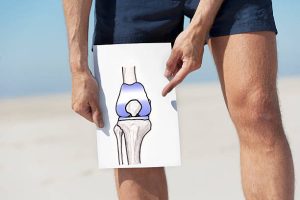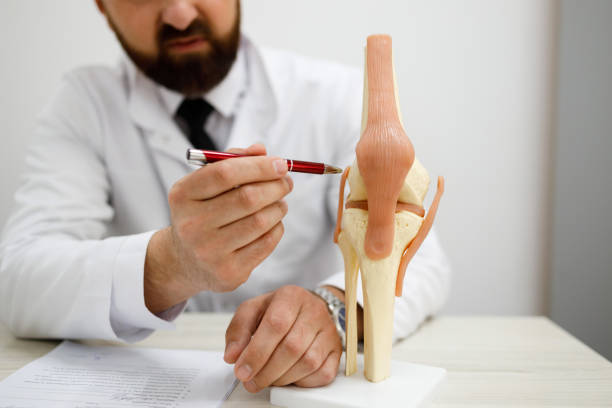When everyday steps become a painful ordeal and knees baulk under the simplest of tasks, the possibility of a knee replacement may float into the conversation. This life-improving procedure stands as a beacon of hope for many, promising a return to the days when a stroll in the park was just that—an untroubled walk, rather than a challenge. This guide aims to provide insight into the transformative world of knee replacement and assist in the decision-making process to ascertain if it’s the appropriate choice for you.
Delving into Knee Replacement Surgery
Contents

Consider knee replacement surgery as a means to reboot your daily motion, much like renovating a home where the broken fixtures are replaced with shiny, new ones. At its core, knee replacement surgery is about substituting a damaged knee joint with a man-made alternative. Its purpose is to breathe life back into the joint, restoring its function and relieving the agony caused by ailments like arthritis.
There are various forms of knee replacement surgeries available, each tailored to the patient’s unique needs. Total knee replacement is the most common, addressing widespread joint damage. Partial knee replacement may be sufficient for those with damage in just one part of the knee. Then, there’s the revision knee replacement, a substitute for an older knee prosthetic that’s past its prime.
Grasping the potential upsides of knee replacement can be a source of hope—countless patients report drastic dips in discomfort and heightened mobility. Of course, there are risks, including the risk of infection, the formation of clots, or lingering pain post-operation. Full comprehension of these potential outcomes is vital and supports an informed decision when contemplating surgery.
Recognizing Knee Replacement Indicators

Perhaps you’re pondering knee replacement and wondering if it’s the right step for you. Symptoms that signal it might be time for this surgery include:
- Persistent knee pain that keeps you awake or wakes you up during the night
- Ongoing knee inflammation and swelling that won’t subside with rest or medication
- A knee that buckles or instils a lack of confidence during everyday activities
Spotting these signs and understanding their implications is crucial. An equally important step is a comprehensive knee replacement consultation, where an orthopaedic surgeon can assess your case’s specifics and gauge if surgery is justified.
Pondering Before Surgery

Deciding on knee replacement surgery is a trenchant choice—one that demands thorough contemplation. Initially, evaluate the severity of your knee pain and its impact on your routine. Does it clip your wings, confining you to a restricted and painful existence? If so, surgery could be worth considering.
Contemplation doesn’t end there. Conventional treatments such as physiotherapy, medication, and lifestyle changes offer alternatives that might alleviate the need for surgery. Peering into these options can reveal non-surgical routes that may prove beneficial, at least as initial strategies.
Your life after knee replacement warrants careful reflection as well. Post-surgery life will introduce a significant healing phase marked by rehabilitation. You’ll need a support system in place as you undertake the journey to full mobility and strength.
The Consultation Journey

A thorough knee replacement consultation involves a meticulous appraisal of your knee’s condition—movement, stability, and overall alignment are put under the lens. X-rays perform a crucial role, revealing the internal state of your knee and the magnitude of joint compromise.
Your consultation’s success hinges on the questions you pose to your surgeon. Discuss their experience, anticipated outcomes, rehabilitation timelines, and the prosthetic knee specifics. This dialogue will empower you with knowledge for the road ahead.
Remember, the consultation is a two-way street: an occasion for you to candidly present your apprehensions, chart out realistic aspirations, and dissect the rehabilitation details that could dictate the success of your new knee. It’s about making sure you’re armed with the right information to make an independently confident decision.
Gearing Up for Surgery

The commitment to knee replacement surgery initiates a series of preparatory steps. It will be necessary to set up home assistance, as mobility will initially be curtailed. You’ll also need support in the form of transportation since driving will be off the table in the short term.
A preoperative phase sees you undergoing medical evaluations to ensure readiness for surgery. For those with existing health conditions, clearance is essential. Your surgeon team may have you adjust current medications to mitigate any surgical and postoperative risks.
Getting yourself physically ready for the operation also matters. Engage in the recommended exercises, ponder a prudent weight loss if need be, and consider quitting habits like smoking. A better pre-op condition could make for a smoother post-op recovery.
Recovery and the Road Back

Emerging from surgery, your focus will shift to recovery and rehabilitation. An initial hospital stay comes packaged with the first steps toward physical healing. Once home, expect limited mobility and reliance on others as you navigate pain management and gradual healing.
Rehabilitation is the cornerstone of a successful recovery; dedication to physical therapy, consisting of flexibility and strength exercises, is non-negotiable. Such measures, although challenging, are designed to ensure your new knee thrives, eventually enabling a return to routine activities and an overall better quality of life.
Looking at long-term recovery, certain lifestyle changes might be in order. For example, some might find they must swap their love for running for a passion for swimming or cycling.
The Long-Term Reality

Typically, knee replacement has an impressive track record, lasting well over a decade for many. Follow-up care will ensure any complications are caught early and managed effectively, contributing to the surgery’s longevity.
Success rates for knee replacements are high, with the majority experiencing pain relief and enhanced mobility. Success also relies on postoperative actions—staying active, maintaining a healthy weight, and attending regular check-ups aid your new knee’s lasting functionality.
Exploring Non-Surgical Routes

Not everyone is a candidate for knee replacement, and some might shy away from surgery. If that’s the case, there are non-surgical tactics available:
- Over-the-counter or prescription anti-inflammatory drugs
- Knee injections including corticosteroids and hyaluronic acid
- Guided physical therapy and exercises adapted for reduced stress on joints
- Support devices like knee braces or shoe inserts
These alternatives serve as a first step, especially for those in the initial stages of joint degeneration. They also offer solutions for individuals who, for health or personal reasons, choose to avoid the surgical route.
Weighing the possibility of knee replacement surgery is a profound and personal journey. It ought to be a deliberate process, incorporating careful thought, an in-depth evaluation of your condition, and a partnership with an experienced orthopaedic surgeon. Each patient’s case is distinctive; what’s critical is that your deliberation leads to a comfortable and informed choice.
In closing, whatever decision you make in your pursuit of a life with less pain and more mobility, it’s commendable to choose actively, whether that means heading into surgery or venturing down alternative paths. It’s vital to secure confidence in your decision, surround yourself with a trusted medical team, and stay hopeful about your active life ahead. Whether it’s slow and steady steps or strides into the surgical suite, your proactive and courageous decision is the first significant leap toward your goal.

